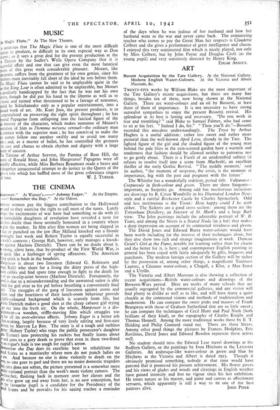THE CINEMA
power." At Warner's.—" Johnny Eager." At the Empire. —"Remember the Day." At the Odeon.
ICAN women pay the biggest contribution to the Hollywood and so they exercise the right to call most of the tunes. Lately haps the excitements of war have had something to do with it) formidable daughters of revolution have revealed a taste for less docile than those normally honoured in a country where glut the market. In film after film women are being slapped in face or punched on the jaw (Ray Milland knocked out a blonde ryweight last week and Robert Taylor is equally successful in week's contests ; George Raft, however, only manages a knock- against Marlene Dietrich). There can be no doubt about it. strong, silent hero, that by-product of the First World War, is again like a harbinger of spring offensives. The American ling spirit is back in the boudoirs.
fanpower is about two linesmen (Edward G. Robinson and rge Raft) who share for a living the dizzy perils of the high- ion cables and find spare time enough to fight to the death for of an ex-clip-joint hostess (Marlene Dietrich). Fortunately, the el is due to a misunderstanding and the unwanted suitor is able hand the girl oiler to his pal before breathing a conveniently final th. The struggles of the gang of linesmen against storm and ent and the heartiness of their lunch-room behaviour provide highly-coloured background which is scarcely from life, but lene Dietrich makes a good shot at the cheap cabaret girl trying get out into the fresh air. On the whole, Manpower is a dis- trnent—a wooden, stiffly-moving film which struggles too for all its over-obvious effects. johtmy Eager is a better job him-making, largely because of very lively editing and first-rate on by Mervyn Le Roy. The story is of a tough and ruthless ster (Robert Taylor) who traps the public prosecutor's daughter Turner) into protecting his rackets but finally learns about and goes to a gory death to prove that even in these two-fisted no rogue's hide is too tough for cupid's arrow. ber the Day does its excellent best to rehabilitate the ,ed States as a matriarchy where men do not punch ladies on W. And because no one is done violently to death on the no one goes to gaol and there are no major domestic tragedies time does not soften, the picture presented is a somewhat more hie national portrait than the week's more violent cameos. The headier, flashing back in memory over her classes and the Who grew up and away from her, is no new conception, but the favourite pupil is a candidate for the Presidency of the States and he provides for his ageing teacher a reminder
of the days when he was jealous of her husband and how her husband went to the war and never came back. The reminiscing teacher who comes to pay the Great Man her respects is Claudette Colbert and she gives a performance of great intelligence and charm. I enjoyed this very sentimental film which is nicely played, not only by Miss Colbert, but by John Payne and Douglas Croft (as the young pupil) and very sensitively directed by Henry King.
EDGAR ANSTEY.


























 Previous page
Previous page